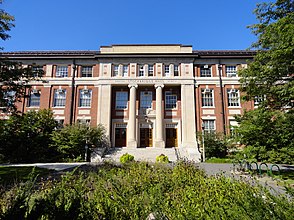This article needs additional citations for verification. (April 2023) |
The Stockbridge School of Agriculture offers Associate of Science, Bachelor of Science, and graduate degrees as an academic unit of the University of Massachusetts Amherst campus. It was founded as part of the Massachusetts Agricultural College (now University of Massachusetts Amherst) in 1918.
| Stockbridge School of Agriculture | |
|---|---|
| College of Natural Sciences University of Massachusetts Amherst | |
 Stockbridge Hall | |
 | |
| Location | Amherst, Massachusetts |
| Coordinates | 42°23′32″N 72°31′46″W / 42.392252°N 72.529373°W |
| Motto | "Give Your Best To Dear Old Stockbridge. Body, heart, soul."[1] |
| Established | 1870 Short Courses 1892 First Official Two-Year Courses[2] 1918 Separate Institution |
| Named for | Levi Stockbridge |
| Colors | Blue and Gold school, unofficial Maroon and White university |
| Gender | Co-educational |
| Administrator | Wesley R. Autio |
| Dean | Tricia Serio |
| Undergraduates | 311 |
| Postgraduates | 36 |
| Fellows | 31 |
| Website | http://stockbridge.cns.umass.edu/ |
The school's main facility and school symbol is Stockbridge Hall, named after Levi Stockbridge, a founder of Massachusetts Agricultural College and its first professor of agriculture; however, its faculty occupies various buildings on the University of Massachusetts campus, including Agricultural Engineering, Bowditch, Clark, Fernald, French, Stockbridge, and West Experiment Station. Research, education, and extension activities occur at the UMass Cold Spring Orchard Research & Education Center, the Hadley Farm (Stockbridge Stables), the Joseph Troll Turf Research Center, the UMass Vegetable & Agronomy Research Farm, and the CNS Greenhouses.
Degrees
editThe following Associate of Science degrees are available at Stockbridge:
- Arboriculture and Community Forest Management
- Equine Management
- Sustainable Food & Farming
- Sustainable Horticulture
- Landscape Contracting
- Turfgrass Management
The following Bachelor of Science Degrees are available:
- Sustainable Food & Farming
- Sustainable Horticulture
- Turfgrass Science & Management
- Plant, Soil, & Insect Sciences
The following graduate degrees are offered:
- M.S. and Ph.D. in Plant Biology
- M.S. and Ph.D. in Organismic & Evolutionary Biology
- M.S. and Ph.D. in Molecular & Cellular Biology
- M.S. in Soil Science
Athletics
editStockbridge has two National Junior College Athletic Association (NJCAA) teams: basketball and golf. As a two–year school, its students are not allowed by the NCAA to play on varsity teams. Stockbridge teams compete against small four-year schools, preparatory schools, and community colleges. Stockbridge students may try out for the Intercollegiate Horse Show Association equestrian team and Intercollegiate Dressage Association team. These teams compete throughout the year with other colleges in the Northeast. Students may also take advantage of many noncompetitive recreational opportunities or participate in the University of Massachusetts' intramural program, one of the largest in the East.
Greek life
editAlpha Tau Gamma is the social and academic fraternity of the Stockbridge School of Agriculture. Their Chapter House is located at 118 Sunset Avenue on several acres of land near the Southwest dormitories. There has been at several time throughout the history of the Stockbridge School of Agriculture a sorority Sigma Sigma Alpha. They are currently not active on campus.
Notable alumni
edit- James Underwood Crockett, producer and host of the public television show The Victory Garden
Accreditation
editStockbridge is accredited through the New England Association of Schools and Colleges
See also
editReferences
edit- ^ This motto was taken from the closing lines of this college song: "'Neath the elms of dear old Amherst stands our college fair, hail to thee our alma mater, Stockbridge men go there. Working ever, falter never, onward toward our goal, give your best to [Dear] Old Stockbridge, Body, Heart, and Soul. Excerpt from The Stosag, 1967.
- ^ Cary, Harold Whiting (1962). "Chapter 5: Recovery and Advance under Goodell". The University of Massachusetts: a History of One Hundred Years. Springfield, Massachusetts: Walter Whittum, Inc. p. 77. OCLC 1029116. Retrieved August 14, 2011.
A further innovation which was announced by President Goodell in 1892, one which proved to be in advance of its time was the introduction of a two-year, non-degree course in practical agriculture. This also was not entirely new, for it had been preceded as early as the 1870s by the admission of special students for the purpose of taking short courses, particularly in the winter terms....The course was continued for three years with a total enrollment of sixty-five, of whom twenty-five completed the requirements for a diploma. It was then suspended, to be replaced by a series of ten short winter courses in several branches of practical work. When it was revived twenty years later, the two-year program met with greater success.